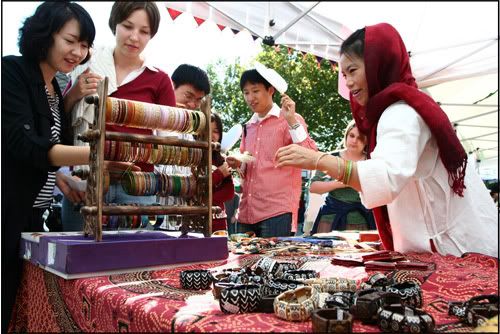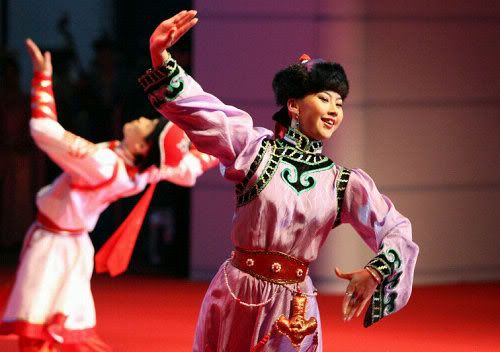Together Day; 세계인의 날
Who knew Korea had so many special days crammed into the month of May? Yesterday was perhaps the newest of them all, as Together Day (세계인의 날) was celebrated for the second year running. Despite the cheesy name - which brings to mind images of couples out for a stroll along Cheonggyecheon - the event is actually an effort by the Korean government to promote cultural exchanges between foreign residents and native Koreans. As the Korea Herald reports, Together Day was introduced by the Ministry of Justice in 2007 to "promote communication and interaction with foreign residents living here [in Korea]". Keep in mind that the foreign population in Korea only just reached 2% of the national total.
One of the things that has always bemused me about the Korean blogosphere are the references to things like how "most foreigners in Korea are English teachers" despite the fact that the current immigration figures list Chinese immigrants as the largest demographic (573,815), followed by those from the United States (115,046), Vietnam (87,436), the Philippines (46,630), and Japan (43,819). While I don't have any figures to back this up, my guess is that there aren't many Chinese nationals working here as English teachers -- and they outnumber Americans (the only non-Asian community to make the top five) 5:1.

Getting back to the original subject, the events organized for Together Day make it look like a truly two-way exchange of cultures and not an attempt at gathering foreign residents together to watch pansori and Arirang marathons. Brian in Jeollanam-do has listed the Gwangju International Center Together Day on his site for quite a while now, and this update from Get in Gwangju has the details of when and where exactly the festivities will take place this weekend; looks like an international food fair will be one of the more prominent highlights of the day. Update: Brian in Jeollanam-do recently added the correct information for Gwangju's event.
Korea.net lists further events for the cities of Siheung, Gimpo, and Daegu that are coming up this weekend. The Siheung Migrants Community Service will feature a number of activities, and while the "Korean singing contest, in which people from overseas will show off their Korean pop star prowess" won't be to everyone's liking, some more serious - and helpful - services will also be provided. According to the korea.net website, "There will be a free medical service made up of dental clinic, internal medicine, surgery. Free legal consulting will also be on offer to provide assistance related to visa and labor issues." Gimpo is planning to offer medical and legal support and, as the home of the largest number of foreign residents in Gyeonggi-do, the city also opened the Gimpo Immigration Management Office last February to offer help in areas that range from "getting a drivers' license to introducing jobs and other daily problems." Lots of stuff is happening in Daegu too -- a book drive, free acupuncture and moxibustion, games, food, legal counseling, a parade, and more. Sounds like it could be fun to check out for the people watching alone. Additional info for all of these is available on the korea.net page linked above.

Of personal interest to me are the activities involving the Central Asian population in Korea, due both to academic interest and the Mongolian community in Uijeongbu. Korea recently sent performers to Uzbekistan and Kazakhstan to promote Korean culture as part of the Korean Cultural Festival in Silk Road, hosted by the Korean Culture and Information Service (KOIS). To the jaded observer this will probably look like another attempt to blatantly push Hallyu - the Korean Wave - in new markets, but keep in mind, too, that Central Asia (Uzbekistan in particular) has the fourth-largest population of ethnic Koreans in the world. This wasn't a one-way cultural exchange, either.
According to the website English News for Migrants Kazakhstan, Uzbekistan, and Turkmenistan also sent representatives to Korea, with 4,000 visitors having attended the first three days of performances at the National Theater of Korea. Migrant workers at the Myeonsarang noodle and sauce company who attended the event were granted back stage access which led to quotes such as the following:
“My heart is bursting because I never would have imagined meeting the stars of my country here in Korea,” said one Uzbek employee, adding that the experience “helps make up for all of my hard days” as a migrant worker living in a foreign country.
One week of festivities can't - and shouldn't - gloss over the poor treatment that migrant workers and foreign brides receive in Korea. However, it does present the opportunity for many Koreans to experience cultures that they may not otherwise encounter. On top of that, there's definitely something to be said about providing migrant workers with not only a public space to display their home culture but one in which they can also build support networks with other members of the immigrant community.
Expect more on this subject in the next couple of days. Despite missing the 'official' Together Day I wanted to at least get the information out there about this weekend's events so that people know what's going on and can attend.
Image credits: Top image from Get in Gwangju. Bottom image from Yonhap News via Naver News.